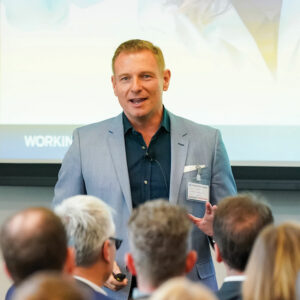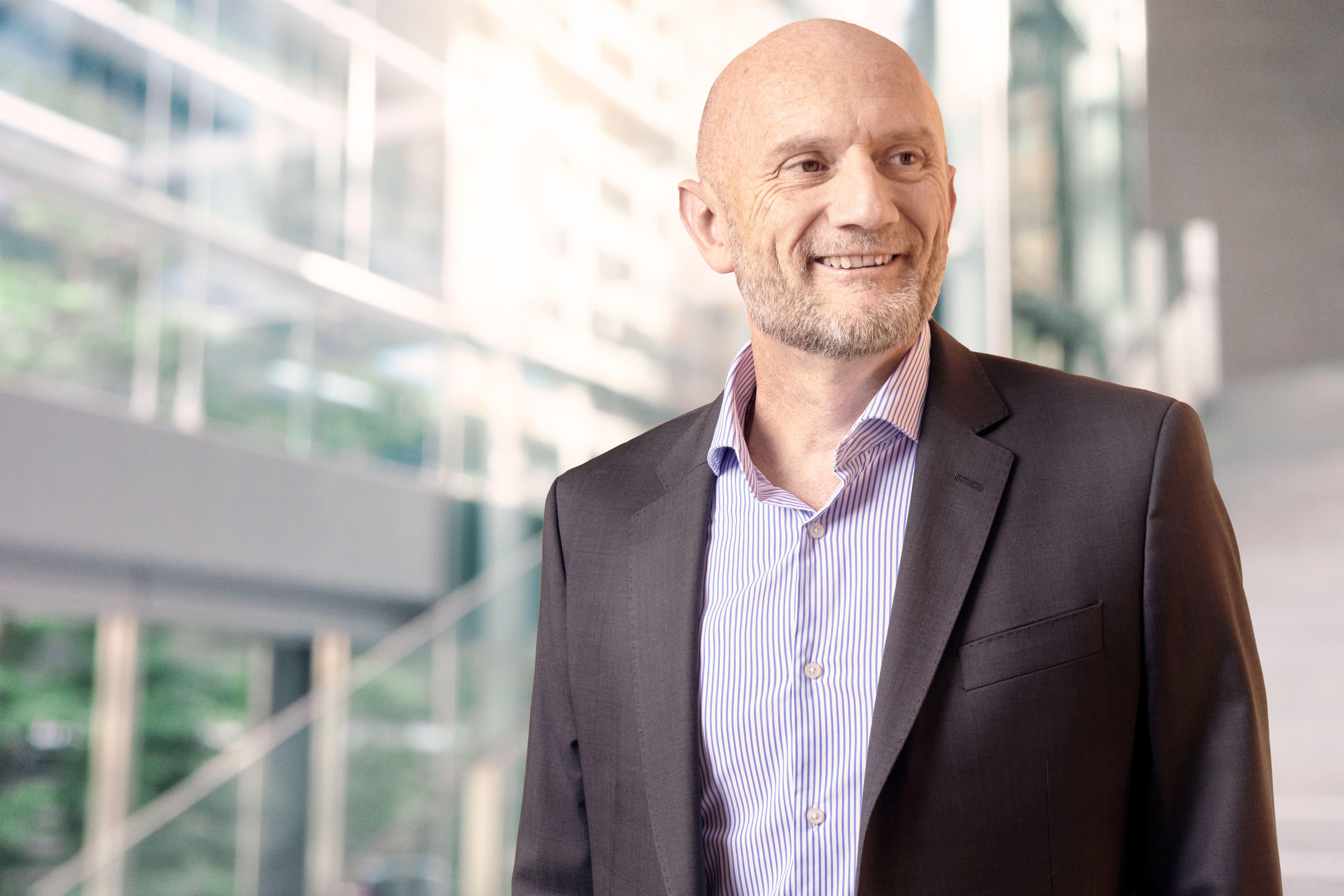Leading Bristol Myers Squibb Acquisition Through Disruption
In 2019, Bristol-Myers Squibb Company and Celgene Corporation announced to the world that they had entered into a definitive acquisition agreement. Bristol-Myers Squibb would acquire Celgene in a cash and stock transaction with an equity value of approximately $74 billion. It was the largest pharmaceutical acquisition in history.
And Neil Archer was in the midst of it. Archer was then the general manager for Germany at Celgene and is now the general manager at Bristol Myers Squibb Germany.
As part of the Bristol Myers Squibb acquisition, BMS and Celgene planned a three-day meeting with approximately 1,000 employees from the two then-separate organizations. On the agenda was a discussion in detail of how the two corporate cultures would become one, and how this new biopharma company would improve the health of the world, particularly patients with cancer, blood disorders, inflammatory and immunologic disease, and cardiovascular disease.
“When any company is acquired, one potential fear is that it’s a pipeline plunder. The leadership of both companies made it very clear from the beginning that this was not the case. We were building a new company.” —Neil Archer, Bristol Myers Squibb
The meeting was scheduled for early 2020. But one week before that chosen date, news about something called a coronavirus began to make increasingly urgent headlines.
“Monday, a week before the world went into lockdown, some people were joking about the pandemic, almost ridiculing it,” Archer recalls. “By midweek, new questions were starting to be asked about the meeting. Friday, it was decision time.”
The meeting was scrubbed, mostly. Archer and his management team still attended what became a crisis planning meeting on dealing with the first lockdown instead of a jubilant meeting about the company acquisition.
How does one help two distinct corporate cultures become one—particularly when everybody’s working remotely and nobody feels connected? Insigniam spoke to Neil Archer to find out.
IQ: During any merger or company acquisition, pandemic or not, so much could go wrong. What were your chief concerns?
Neil Archer: Distractions were a huge concern. So was attrition. When you’re going through an acquisition there are a lot of distractions, and many people get worried, and they leave, and meanwhile, you have a business to run. So for many months, while you’re waiting for the acquisition to go through, you really have to be a traditional leader but also a very empathetic psychologist, listener and coach.

IQ: What kind of encouragement did you give your employees?
Mr. Archer: When any company is acquired, one potential fear is that it’s a pipeline plunder: We’re buying you for your pipeline, your products, thank you very much, there’s the door. The senior leadership of both companies made it very clear from the beginning that this was not the case. We were building a new company, and this was going to be an exciting, positive development for everybody. This was a chance to create a new company.
There was a high degree of humility from both sides, where we made it clear we could all learn something from each other. I think that diluted much of the fear. Still, there was some attrition, and of course, people leave. And I took it very hard when people decided to leave. But I came to realize that my job wasn’t to get people to stay. It was to try and convince people to make decisions with objective criteria and leave emotions at the door, particularly in those early months when there were few concrete facts about what life on the other side of the acquisition would actually look and feel like. I tried to teach people about emotional bias, and about making decisions based on reality. It pains me to see people make decisions based on an emotional storm when I know they could have, and would have had, a great opportunity in the organization.
IQ: Why was this a successful company acquisition? What went right?
Mr. Archer: Firstly, the people were remarkably similar. The people in both companies all had what I like to call a true north star that guided us, a genuine desire to help many thousands of patients with some of humanity’s most deadly diseases. It always helps when you have shared values and a common goal.
But I also think the humility shown by both organizations was really helpful. I remember the first time I had a meeting with colleagues at BMS. The company was interested in learning from and adopting best practices from Celgene, which was perceived to be younger, agile and dynamic. At the same time, there was much to learn from BMS with respect to its processes and resources. We had a lot to learn from each other.
IQ: That’s a great story. It sounds like you all had the right attitude.
Mr. Archer: The lack of any sense of being the dominant partner on both sides was healthy. There was an acceptance that we’d all learn a lot from each other.
IQ: The company acquisition was formally completed in November 2019. Lockdowns soon followed. How did you and your team bring the two companies and their cultures together at a time when nobody was together?
Mr. Archer: Whether you work remotely or not, when two companies come together, we will all be introduced to new bosses, new peers, new subordinates. In our case, we were just going through this with people we weren’t actually meeting in person. If you choose the right people, with a clear view of what they need to achieve, and you share this common true north, the human connection is going to work.
You do have to make an effort to make the human connection when you’re all working separately. When I was working out of my office, for instance, I would walk to the corner shop to pick up lunch, and I always made a point to call somebody on my team on the way there and back.
IQ: When you look back at the early days of the Bristol Myers Squibb acquisition, is there anything you would do differently?
Mr. Archer: Well, one way to look at it is with the metaphor of wartime leadership and peacetime leadership, and going through all of this in the midst of the pandemic, we were certainly engaged in wartime leadership. As focused as we were on the business, there was a little thinking about what life would be like once we were back to business as usual, after the stress of the acquisition and the lockdown were both in the past. We may be playing a little bit of catch-up now, in getting the organization to compete in the new world.
I probably would have spent more time than we did, maybe 15% to 20% of the time, looking forward to 2023, to what people and mindset we would need, rather than focusing on the here and now of the stressful situation we were in.
IQ: What advice can you give an executive going through an acquisition?
Mr. Archer: During any merger, or acquisition, irrespective of a global pandemic or not, the most valuable thing you can have is a great team around you. You can’t do everything yourself, and so you need to select your team for a number of things. Obviously, to run their part of the business at the highest possible standards in a very competitive environment. They also need excellent judgment and the bandwidth to exercise their unique skills. They should be very good listeners and reliable conduits of information, particularly when forced to work remotely. You need to be able to take the pulse of what’s going on. It can be very difficult to get a sense of context when good or bad things happen without proximity to a representative sample of employees to provide a balanced viewpoint. We coined a phrase during that time—are we hearing the view of five or 500?
IQ: That’s excellent advice.
Mr. Archer: Well, it’s very easy to lose proportionality when you can’t sit with somebody and have a coffee and really get context. I’d also tell anyone going through a merger or acquisition that while it might feel like the end, especially if you’re on the side that’s being acquired, it’s really a beginning. We had great help from Insigniam with this.
People would be well advised to find and engineer a process that involves all corners and levels of the organization to help determine how a company is going to operate after an acquisition. You want guardrails and lines, but you want to democratize things as much as possible and involve as many people as you can. You want them to give you the answer, instead of you giving them the answer. You’re not as smart as you think you are if you’re only huddled in an ivory tower with your leadership team.

And this wasn’t just any company acquisition. It was one of the biggest in history.
The acquisition naturally entailed complexities around HR, IT systems,
drug distribution processes, marketing authorities and the financial side of the business, says Owen. “But this is the backdrop to merging people and cultures.” No matter how much logistical complexity an acquisition entails, she says, culture trumps everything. “Cultures are created over time. They are the main reason people stay on at a company after an acquisition.”
The compatible cultures of both companies helped ensure the successful acquisition. “I joined BMS about eight weeks prior to the official acquisition date, but teams had been planning for a good year already,” Owen says. “All of the central and cross-functional teams were resourced from the start, and there was a central office of integration, which literally managed all the spokes of the wheel, so it felt like it was under control.”
Owen notes that Giovanni Caforio, chairman and CEO of BMS, made a deliberate choice to truly integrate the companies and take the best of each. “The tone came from the top—from Caforio and his leadership team, which included people from heritage Celgene and BMS,” Owen says. “Together, they co-created a new company mission and vision, along with new core values.”
All of this had to be communicated quickly throughout the newly integrated companies. “At every level of the organization we were educated as to why these new values were important,” Owen says. “We had grassroots sets of change champions across all countries and all functions. It was very well done. And it’s not over.”
In addition to culture, of course, thorough planning was essential. “The secret was an understanding of staging—what to integrate, when, how, the importance of change sequence,” Owen says. “It certainly doesn’t all happen overnight. It’s a series of simultaneous actions that are orchestrated and coordinated. You need real specialists who can direct and coordinate.
“This is a journey. It has been an amazing experience, one that has taught a lot of lessons in leadership, communication, the importance of clarity and the overwhelming impact of culture on a company’s success.”
This article appeared in the Summer 2022 issue of Insigniam Quarterly with the headline “Neil Archer Leads Through Disruption.” To begin receiving IQ, go here.



